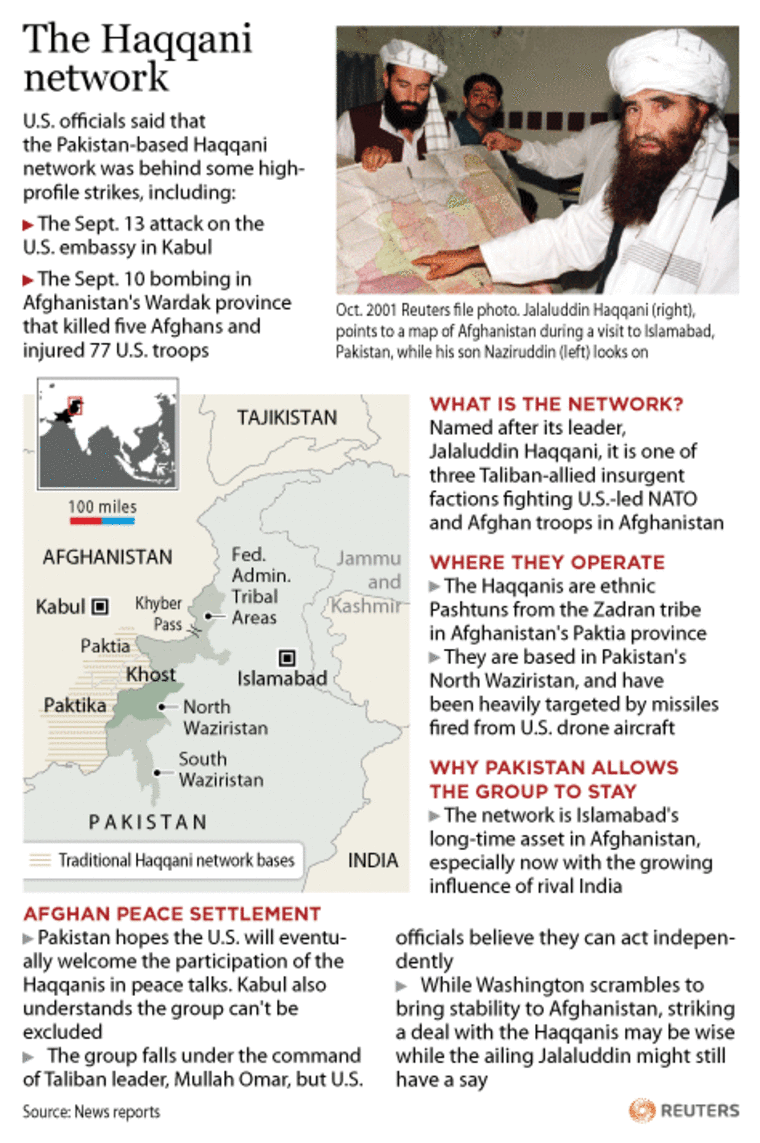Pakistan warned the United States it risks losing an ally if it continued to accuse Islamabad of playing a double game in the war against militancy, escalating the crisis in relations between the two countries.
Foreign Minister Hina Rabbani Khar was responding to comments by U.S. Joint Chiefs of Staff Admiral Mike Mullen, who said Pakistan's top spy agency supported attacks on the U.S. Embassy and other targets by the Haqqani network, the most violent and effective faction among Islamic Taliban militants in Afghanistan.
It is the most serious allegation leveled by the United States against nuclear-armed and Muslim-majority Pakistan since they began an alliance in the "war on terrorism" a decade ago.
"You will lose an ally," Khar told Geo TV in New York in remarks broadcast on Friday.
"You cannot afford to alienate Pakistan, you cannot afford to alienate the Pakistani people. If you are choosing to do so and if they are choosing to do so it will be at their own cost."
The White House on Friday reiterated its call for Pakistan to cut its ties to the Haqqani network and shut down safe havens on the Afghanistan-Pakistan frontier.

"It is critical that the government of Pakistan break any links they have and take strong and immediate action against this network so that they are no longer a threat to the United States or to the people of Pakistan, because this network is a threat to both," White House spokesman Jay Carney said.
Mullen, speaking in Senate testimony, alleged Haqqani operatives launched an attack last week on the U.S. Embassy in Kabul with the support of Pakistan's military intelligence.
Pakistan's chief of army staff, General Ashfaq Parvez Kayani, rejected Mullen's comments as "very unfortunate and not based on facts."
"Singling out Pakistan is neither fair nor productive," he said, according to a military statement released Friday night.
The tensions could have repercussions across Asia, from India, Pakistan's economically booming arch-rival, to China, which has edged closer to Pakistan in recent years.
A complete break between the United States and Pakistan -- sometimes friends, often adversaries -- seems unlikely, if only because Washington depends on Pakistan for supply routes to U.S. troops fighting militants in Afghanistan, and as a base for unmanned U.S. drones.
'Co-dependents'
Pakistan relies on Washington for military and economic aid and for acting as a backer on the world stage.
"The message for America is: 'They can't live with us, they can't live without us," said Prime Minister Yusuf Raza Gilani.
But support in the U.S. Congress for curbing assistance or making conditions on aid more stringent is rising rapidly.
The unilateral U.S. Navy SEALs raid that killed Osama bin Laden in Pakistan in May took already fragile relations between Pakistan and the United States to a low.
Relations were just starting to recover before the Kabul attack. Both sides are now engaged in an unusually blunt public war of words.
The dangers could be enormous if Washington and Pakistan, a largely dysfunctional state teeming with Islamist militants and run by a feckless, military-cowed government, fail to arrest the deterioration in relations.
At stake are the fight against terrorism, the security of Pakistan's nuclear arsenal and - as Islamabad plays off its friendship with China against the United States - regional stability.
Humiliation
"Anything which is said about an ally, about a partner, publicly to recriminate it, to humiliate it, is not acceptable," said Khar.
The United States has long pressed Pakistan to go after the Haqqani network, which it believes operates from sanctuaries in North Waziristan on the Afghan border.
Pakistan says its army is too stretched fighting its own Taliban insurgency. But analysts say the Islamabad government regards the Haqqanis as a way to exert its influence on any future political settlement in Afghanistan.
The Haqqani network, Mullen said, is a "veritable arm" of Pakistan's Inter-Services Intelligence agency (ISI).
The charges come amid mounting exasperation in Washington as the Obama administration struggles to curb militancy in Pakistan and end the long war in Afghanistan.
Mullen, CIA director David Petraeus and Secretary of State Hillary Clinton all have met with their Pakistani counterparts in recent days to demand Islamabad take action against the Haqqani network.
Any Pakistani offensive against the Haqqanis would be risky. The group has an estimated 10,000-15,000 seasoned fighters at its disposal and analysts say the Pakistani army would likely suffer heavy casualties.
Mahmud Durrani, a retired major general and former Pakistani ambassador to Washington, said both sides should ease tensions to avoid American military action beyond drone strikes or economic sanctions.
"There's a possibility. It's wide open. But it will be absolutely, totally disastrous."
Limited 'strategic convergence'Privately, Pakistani military and intelligence officials have told NBC News that their "strategic convergence" with the United States extends only so far as a stable and secure Afghanistan and the elimination of al-Qaida from the region. The Haqqanis, they argue, have never posed a threat to, nor carried out attacks within, Pakistan.
Sirajuddin Haqqani, the group's commander, said in a recent Reuters interview that he would take part in peace talks with Kabul only if the Taliban also joined the negotiations. Pakistani military and intelligence officials have echoed this desire to see the Haqqanis brought into the Afghanistan reconciliation negotiations, rather than targeted militarily.
Pakistani officials also express concern that launching a full-scale operation against the Haqqanis could lead militants to direct attacks against the Pakistani state rather than against international forces in Afghanistan.
Such a situation would remain a threat to Pakistan's stability long after the United States leaves the region. "We'll be left just like we were after the Soviet war," one Pakistani intelligence official told NBC.